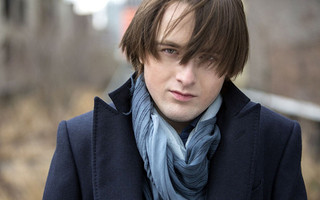|
Back
Behold The Giant New York
Isaac Stern Auditorium, Carnegie Hall
12/09/2014 - & November 7 (Lyon), 8 (Paris), December 25 (Moscow), 2014, February 3 (Bilbao), 4 (Lisboa), 5 (Valladolid), 2015
Johann Sebastian Bach: Fantasy and Fugue for Organ in G Minor BWV 542 (transcribed for piano by Franz Liszt, S. 463)
Ludwig van Beethoven: Piano Sonata No. 32 in C Minor, Opus 111
Franz Liszt: Transcendental Etudes, S. 139
Daniil Trifonov (Piano)

D. Trifonov (© Dario Acosta)
An acquaintance told me that he actually cried during Daniil Trifonov’s first recital at Carnegie Hall last year. I doubt that anybody shed tears during the 23-year-old wunderkind’s second recital last night. But nobody could have resisted the sheer muscular might, the daring, the audacity and, yes, the stunning artistry of this great pianist.
The concert was indeed audacious. Not only for its unrelenting gravity, but for programing the entire group of Liszt Transcendental Etudes going over an hour with hardly a moment’s pause between any of the twelve. A single one of these mammoth pieces would serve as the ultimate bravura work for any soloist. But it could, theoretically be an Augean challenge for the artist’s digits and the audience’s ears.
Not that this stopped Mr. Trifonov for a second. The intermission called for a severe re-tuning of the Steinway (he did not spare the piano for a moment!), and he strode on, dashed out the thundering Preludio, and then managed to work over the next eleven with equal elan, equal thunder.
Let’s face facts. Mr. Trifonov, despite his young years, his very youthful appearance, is a pianist of another age. The age of young Horowitz, of Cherkassky and Godovsky, the age when possible hazards on the keyboard are mere bagatelles, when slips on the keys are risible trifles. This was a man who played Liszt for the thrill of the sounds. And if the notes were blurred, the mighty roles of the octaves were blurred in a cloud of volcanic smoke, then to hell with the consequences.
The music, with few exceptions, was tumultuous. The Mazeppa almost screams for diabolic technique, yet Mr. Trifonov sped through the great passages as if his body had become the piano. The Wilde Jagd was a swashbuckling essay, and the Allegro agitato molto almost exceeded Liszt’s dynamics.
Like a child waiting for unwrap a Christmas present, we were presented with music of Schumanesque simplicity–Feux follets, Paysage, Vision–and could barely wait until the wrappings were taken off and the Gargantuan gift of -muscularity was presented.
Oh, Mr. Trifonov had his sensitive side, no doubt about that. Harmonies du soir was a poetic dream of evening, Ricordanza was poetry in motion. The single encore by Medtner was most poetic. But there was little doubt he preferred the savage Eroica, the Molto vivace to make his points.
This concert was being recorded for television, but if he was to make a disc, I fear that massive editing would be in the offing. Mr. Trifonov kept his foot on the pedal, which, added to the Carnegie Hall natural resonance, meant not only some digital errors, but the “transparency” of more delicate pianists was rare.
Still, while Franz Liszt hardly had a piano like the Steinway, I feel certain he played the Etudes with this throwaway genius. Let those perfumed salon piano-players play their Chopin and Mendelssohn and Schumann. Daniil Trifonov, like Franz Liszt, was ready to wrestle with giants.
The first half was more cerebrally programmed, but no less mighty. In fact, Franz Liszt had his metaphorical foot in the door for the opening Bach. I had just read Alex Ross’s wonderful exegesis of the organ in this week’s New Yorker, and his own words were reflected in the organ-like sonorities of the original Bach G Minor Prelude and Fugue for Organ. That Prelude was offered with a feeling of improvisation, the artist sitting ramrod-straight in honor of the music. For the Fugue, he bent over for that precise careful and (unlike the Etudes) transparent respect for each line.
And now we come to the Beethoven, that last Sonata so profound that even in the Stucky/Denk opera The Classical Style, the trills were quoted in the orchestral strings. The word here was intensity. Mr. Trifonov, without a shred of idiosyncratic eccentricity, offered a most organic work. Nothing, not even the third variation of the Arietta touched on the violence with which Mr. Trifonov is so adept.
Instead, we had, from those first notes, a work played with little Romantic rubato. By taking it straight, by allowing those notes to speak for themselves, he created a fully-developed structure. It was not a “divine” Beethoven, or a Beethoven over which one would cry. But with its rhythmic structure and emotional progress, we were offered a most human Beethoven.
And that, coming from a superhuman piano-player,was miracle enough for a single evening.
Harry Rolnick
|